Deck 8: Trigonometric Functions
Question
Question
Question
Question
Question
Question
Question
Question
Question
Question
Question
Question
Question
Question
Question
Question
Question
Question
Question
Question
Question
Question
Question
Question
Question
Question
Question
Question
Question
Question
Question
Question
Question
Question
Question
Question
Question
Question
Question
Question
Question
Question
Question
Question
Question
Question
Question
Question
Question
Question
Question
Question
Question
Question
Question
Question
Question
Question
Question
Question

Unlock Deck
Sign up to unlock the cards in this deck!
Unlock Deck
Unlock Deck
1/60
Play
Full screen (f)
Deck 8: Trigonometric Functions
1
Solve the triangle for the indicated side and angle. 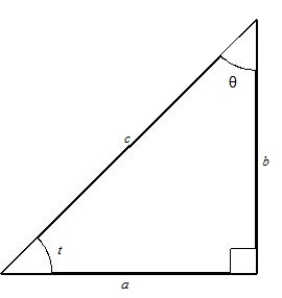 a = 5,b = 5,
a = 5,b = 5, 
A) angle θ: 45°
Side c:
B) angle θ: 45°
Side c:
C) angle θ: 45°
Side c: 20
D) angle θ: 30°
Side c: 10
E) angle θ: 30°
Side c:20
 a = 5,b = 5,
a = 5,b = 5, 
A) angle θ: 45°
Side c:

B) angle θ: 45°
Side c:

C) angle θ: 45°
Side c: 20
D) angle θ: 30°
Side c: 10
E) angle θ: 30°
Side c:20
angle θ: 45°
Side c:
Side c:

2
Solve the triangle for the indicated side. 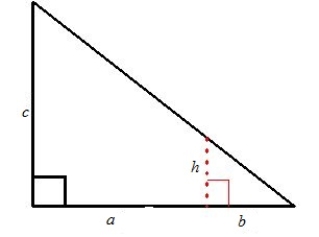

A) side h:
B) side h:
C) side h:
D) side h:
E) side h:


A) side h:

B) side h:

C) side h:

D) side h:

E) side h:

side h: 

3
Find the radian measure of the given angle. 
A)
B)
C)
D)
E)

A)

B)

C)

D)

E)


4
Find the cosine of θ. 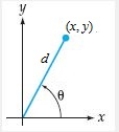

A)
B)
C)
D)
E)


A)

B)

C)

D)

E)


Unlock Deck
Unlock for access to all 60 flashcards in this deck.
Unlock Deck
k this deck
5
Evaluate without using a calculator. 
A) undefined
B)
C)
D)
E) 0

A) undefined
B)

C)

D)

E) 0

Unlock Deck
Unlock for access to all 60 flashcards in this deck.
Unlock Deck
k this deck
6
Find the degree measure of the given angle.Round to the nearest tenth. 
A) 80.0°
B) 160.0°
C) 165.0°
D) 202.5°
E) 170.0°

A) 80.0°
B) 160.0°
C) 165.0°
D) 202.5°
E) 170.0°

Unlock Deck
Unlock for access to all 60 flashcards in this deck.
Unlock Deck
k this deck
7
A guy wire is stretched from a broadcasting tower at a point 250 feet above the ground to an anchor 150 feet from the base (see figure).How long is the wire? 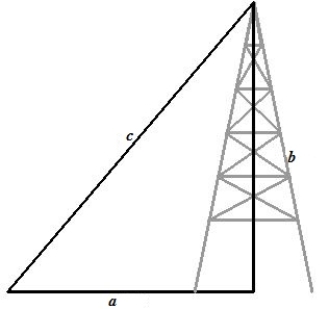

A) 291.55 feet
B) 193.65 feet
C) 150.83 feet
D) 412.31 feet
E) 244.95 feet


A) 291.55 feet
B) 193.65 feet
C) 150.83 feet
D) 412.31 feet
E) 244.95 feet

Unlock Deck
Unlock for access to all 60 flashcards in this deck.
Unlock Deck
k this deck
8
Determine the quadrant in which  lies if sinθ<0 and cosθ>0.
lies if sinθ<0 and cosθ>0.
A) fourth quadrant
B) third quadrant
C) first quadrant
D) second quadrant
E) second or third quadrants
 lies if sinθ<0 and cosθ>0.
lies if sinθ<0 and cosθ>0. A) fourth quadrant
B) third quadrant
C) first quadrant
D) second quadrant
E) second or third quadrants

Unlock Deck
Unlock for access to all 60 flashcards in this deck.
Unlock Deck
k this deck
9
A sector of a circle is the region bounded by two radii of the circle and their intercepted arc (see figure). 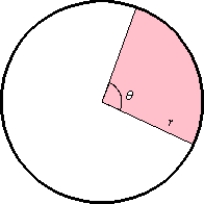
For a circle of radius r the area A of a sector of the circle with central angle θ (measured in radians)is given by A sprinkler system on a farm is set to spray water over a distance of 70 feet and rotates through an angle of 90°.Use the above given information to find the area of the region.Round your answer to two decimal places.
A sprinkler system on a farm is set to spray water over a distance of 70 feet and rotates through an angle of 90°.Use the above given information to find the area of the region.Round your answer to two decimal places.
A) 3,848.45
B) 1,225.00
C) 2,348.45
D) 5,348.45
E) 7,696.90

For a circle of radius r the area A of a sector of the circle with central angle θ (measured in radians)is given by
 A sprinkler system on a farm is set to spray water over a distance of 70 feet and rotates through an angle of 90°.Use the above given information to find the area of the region.Round your answer to two decimal places.
A sprinkler system on a farm is set to spray water over a distance of 70 feet and rotates through an angle of 90°.Use the above given information to find the area of the region.Round your answer to two decimal places.
A) 3,848.45
B) 1,225.00
C) 2,348.45
D) 5,348.45
E) 7,696.90

Unlock Deck
Unlock for access to all 60 flashcards in this deck.
Unlock Deck
k this deck
10
Determine two coterminal angles (one positive and one negative)for each angle.Give the answers in radians. 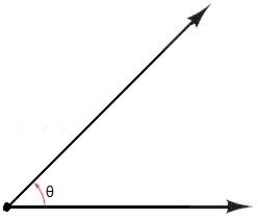

A) positive:
Negative:
B) positive:
Negative:
C) positive:
Negative:
D) positive:
Negative:
E) positive:
Negative:


A) positive:

Negative:

B) positive:

Negative:

C) positive:

Negative:

D) positive:

Negative:

E) positive:

Negative:


Unlock Deck
Unlock for access to all 60 flashcards in this deck.
Unlock Deck
k this deck
11
Find the cosine of θ. 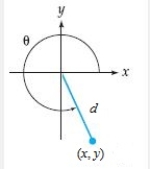

A) 
B) 
C)
D)
E)


A)

B)

C)

D)

E)


Unlock Deck
Unlock for access to all 60 flashcards in this deck.
Unlock Deck
k this deck
12
Evaluate without using a calculator,leaving the answers in exact form. 
A)
B)
C) 0
D) -1
E)

A)

B)

C) 0
D) -1
E)


Unlock Deck
Unlock for access to all 60 flashcards in this deck.
Unlock Deck
k this deck
13
A compact disc can have an angular speed up to 3,154 radians per minute.At this angular speed,how many revolutions per minute would the CD make? Round your answer to the nearest integer.
A) 1,004
B) 1,577
C) 402
D) 502
E) 251
A) 1,004
B) 1,577
C) 402
D) 502
E) 251

Unlock Deck
Unlock for access to all 60 flashcards in this deck.
Unlock Deck
k this deck
14
From the given function  ,find the following trigonometric function.
,find the following trigonometric function. 
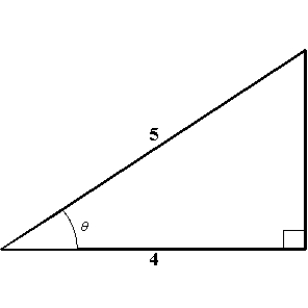
A)
B)
C)
D)
E)
 ,find the following trigonometric function.
,find the following trigonometric function. 

A)

B)

C)

D)

E)


Unlock Deck
Unlock for access to all 60 flashcards in this deck.
Unlock Deck
k this deck
15
Find  given that
given that  and
and 
A)
B)
C)
D)
E)
 given that
given that  and
and 
A)

B)

C)

D)

E)


Unlock Deck
Unlock for access to all 60 flashcards in this deck.
Unlock Deck
k this deck
16
Find  from the given graph.
from the given graph. 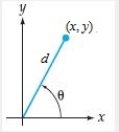

A)
B)
C)
D)
E)
 from the given graph.
from the given graph. 

A)

B)

C)

D)

E)


Unlock Deck
Unlock for access to all 60 flashcards in this deck.
Unlock Deck
k this deck
17
Find the radian measure of the given angle. 
A)
B)
C)
D)
E)

A)

B)

C)

D)

E)


Unlock Deck
Unlock for access to all 60 flashcards in this deck.
Unlock Deck
k this deck
18
Solve the triangle for the indicated angle. 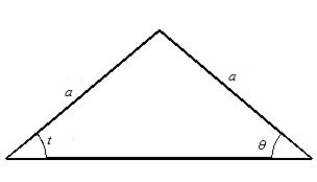

A) angle θ: 53°
B) angle θ: 42°
C) angle θ: 56°
D) angle θ: 37°
E) angle θ: 27°


A) angle θ: 53°
B) angle θ: 42°
C) angle θ: 56°
D) angle θ: 37°
E) angle θ: 27°

Unlock Deck
Unlock for access to all 60 flashcards in this deck.
Unlock Deck
k this deck
19
Find the area of the equilateral triangle with sides of length  in.Round your answer to two decimal places.
in.Round your answer to two decimal places.
A) 55.43 square inches
B) 16.00 square inches
C) 27.71 square inches
D) 32.00 square inches
E) 45.25 square inches
 in.Round your answer to two decimal places.
in.Round your answer to two decimal places. A) 55.43 square inches
B) 16.00 square inches
C) 27.71 square inches
D) 32.00 square inches
E) 45.25 square inches

Unlock Deck
Unlock for access to all 60 flashcards in this deck.
Unlock Deck
k this deck
20
Find the cosine of θ. 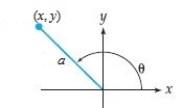

A)
B)
C)
D)
E)


A)

B)

C)

D)

E)


Unlock Deck
Unlock for access to all 60 flashcards in this deck.
Unlock Deck
k this deck
21
Approximate using a calculator (set for radians).Round answers to two decimal places. 
A) -0.65
B) -0.76
C) -0.99
D) 0.15
E) 0.35

A) -0.65
B) -0.76
C) -0.99
D) 0.15
E) 0.35

Unlock Deck
Unlock for access to all 60 flashcards in this deck.
Unlock Deck
k this deck
22
Solve the equation below for  For some of the equations you should use the trigonometric identities listed in this section.Use the trace feature of a graphing utility to verify your results.
For some of the equations you should use the trigonometric identities listed in this section.Use the trace feature of a graphing utility to verify your results. 
A) 
B) 
C) 
D) 
E) 
 For some of the equations you should use the trigonometric identities listed in this section.Use the trace feature of a graphing utility to verify your results.
For some of the equations you should use the trigonometric identities listed in this section.Use the trace feature of a graphing utility to verify your results. 
A)

B)

C)

D)

E)


Unlock Deck
Unlock for access to all 60 flashcards in this deck.
Unlock Deck
k this deck
23
Solve the equation below for θ  For some of the equations you should use the trigonometric identities listed in this section.Use the trace feature of a graphing utility to verify your results.
For some of the equations you should use the trigonometric identities listed in this section.Use the trace feature of a graphing utility to verify your results. 
A)
B)
C) 
D) 
E) 
 For some of the equations you should use the trigonometric identities listed in this section.Use the trace feature of a graphing utility to verify your results.
For some of the equations you should use the trigonometric identities listed in this section.Use the trace feature of a graphing utility to verify your results. 
A)

B)

C)

D)

E)


Unlock Deck
Unlock for access to all 60 flashcards in this deck.
Unlock Deck
k this deck
24
Use a calculator to evaluate the trigonometric function  to four decimal places.
to four decimal places.
A) -1.6266
B) -1.4281
C) -0.6148
D) 0.8192
E) -0.7002
 to four decimal places.
to four decimal places. A) -1.6266
B) -1.4281
C) -0.6148
D) 0.8192
E) -0.7002

Unlock Deck
Unlock for access to all 60 flashcards in this deck.
Unlock Deck
k this deck
25
In traveling across flat land,you notice a mountain directly in front of you.Its angle of elevation (to the peak)is 3.5°.After you drive 13 miles closer to the mountain,the angle of elevation is 9°.Approximate the height of the mountain.Round your answer to two decimal places. 

A) 51.64 miles
B) 8.18 miles
C) 1.58 miles
D) 1.30 miles
E) 16.36 miles


A) 51.64 miles
B) 8.18 miles
C) 1.58 miles
D) 1.30 miles
E) 16.36 miles

Unlock Deck
Unlock for access to all 60 flashcards in this deck.
Unlock Deck
k this deck
26
Evaluate without using a calculator,leaving the answers in exact form. 
A)
B)
C) -1
D)
E)

A)

B)

C) -1
D)

E)


Unlock Deck
Unlock for access to all 60 flashcards in this deck.
Unlock Deck
k this deck
27
Find two values of θ that satisfy the equation below.Give values of θ in radians  Do not use a calculator.
Do not use a calculator. 
A)
B)
C)
D)
E)
 Do not use a calculator.
Do not use a calculator. 
A)

B)

C)

D)

E)


Unlock Deck
Unlock for access to all 60 flashcards in this deck.
Unlock Deck
k this deck
28
Find the period of the trigonometric function. 
A)
B)
C)
D)
E)

A)

B)

C)

D)

E)


Unlock Deck
Unlock for access to all 60 flashcards in this deck.
Unlock Deck
k this deck
29
Solve the equation for θ  For some of the equations you should use the trigonometric identities listed in this section.Use the trace feature of a graphing utility to verify your results.
For some of the equations you should use the trigonometric identities listed in this section.Use the trace feature of a graphing utility to verify your results. 
A)
B) 
C) 
D) 
E) 
 For some of the equations you should use the trigonometric identities listed in this section.Use the trace feature of a graphing utility to verify your results.
For some of the equations you should use the trigonometric identities listed in this section.Use the trace feature of a graphing utility to verify your results. 
A)

B)

C)

D)

E)


Unlock Deck
Unlock for access to all 60 flashcards in this deck.
Unlock Deck
k this deck
30
A 22-foot ladder leaning against the side of a house makes a 77° angle with the ground (see figure).How far up the side of the house does the ladder reach? Round your answer to four decimal places. 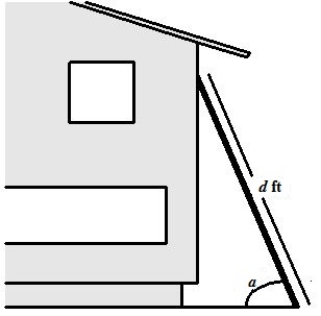

A) 21.4361 feet
B) 22.5787 feet
C) 4.9489 feet
D) 5.0791 feet
E) 97.7991 feet


A) 21.4361 feet
B) 22.5787 feet
C) 4.9489 feet
D) 5.0791 feet
E) 97.7991 feet

Unlock Deck
Unlock for access to all 60 flashcards in this deck.
Unlock Deck
k this deck
31
Match the function below with the correct graph. 
A) 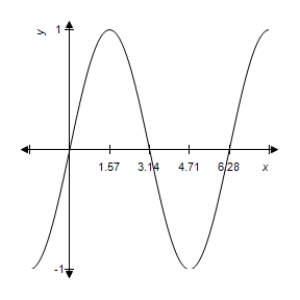
B) 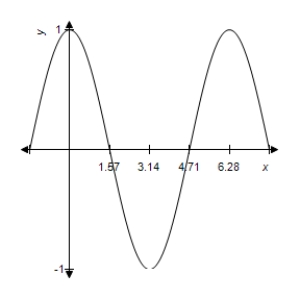
C) 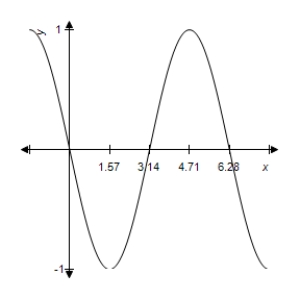
D) 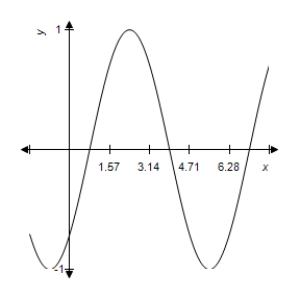
E) 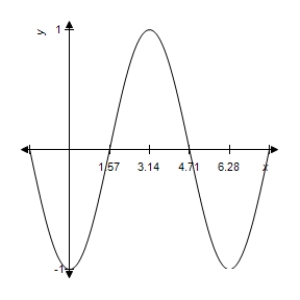

A)

B)

C)

D)

E)


Unlock Deck
Unlock for access to all 60 flashcards in this deck.
Unlock Deck
k this deck
32
Find the derivative of the trigonometric function. 
A)
B)
C)
D)
E)

A)

B)

C)

D)

E)


Unlock Deck
Unlock for access to all 60 flashcards in this deck.
Unlock Deck
k this deck
33
Find a and d for  such that the graph of f matches the figure.
such that the graph of f matches the figure. 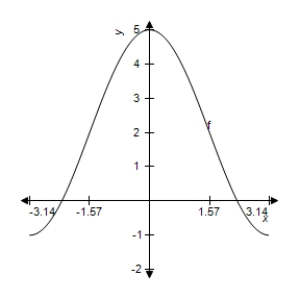
A)
B)
C)
D)
E)
 such that the graph of f matches the figure.
such that the graph of f matches the figure. 
A)

B)

C)

D)

E)


Unlock Deck
Unlock for access to all 60 flashcards in this deck.
Unlock Deck
k this deck
34
Sketch the graph of the function 
A)
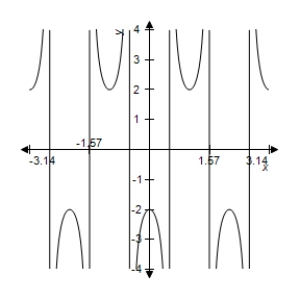
B) 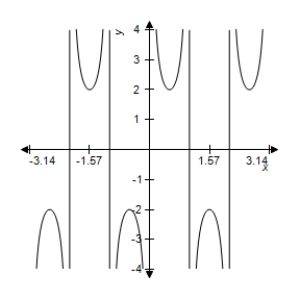
C) 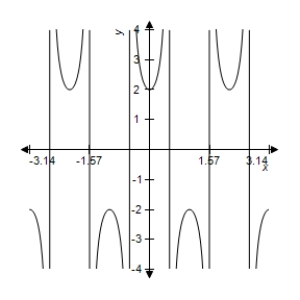
D) 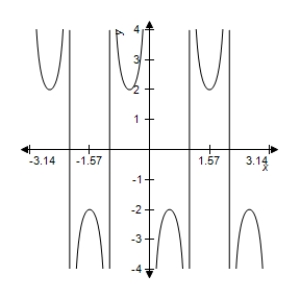
E) 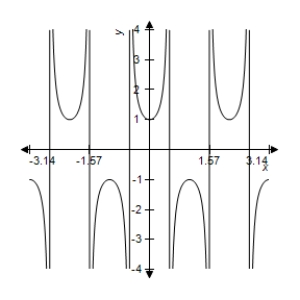

A)

B)

C)

D)

E)


Unlock Deck
Unlock for access to all 60 flashcards in this deck.
Unlock Deck
k this deck
35
Sketch the graph of the function 
A) 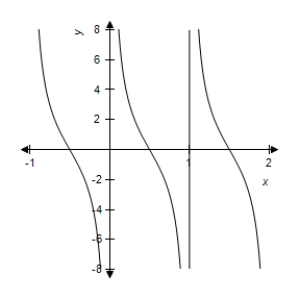
B) 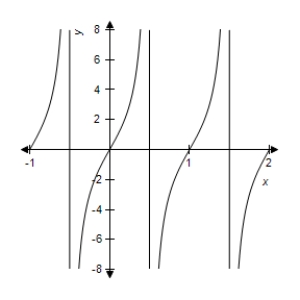
C) 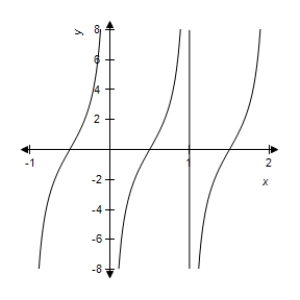
D) 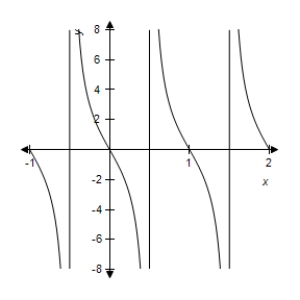
E) 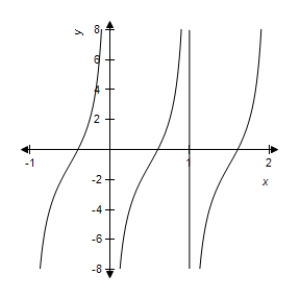

A)

B)

C)

D)

E)


Unlock Deck
Unlock for access to all 60 flashcards in this deck.
Unlock Deck
k this deck
36
Find two values of θ that satisfy the equation below.Give values of θ in radians  Do not use a calculator.
Do not use a calculator. 
A)
B)
C)
D)
E)
 Do not use a calculator.
Do not use a calculator. 
A)

B)

C)

D)

E)


Unlock Deck
Unlock for access to all 60 flashcards in this deck.
Unlock Deck
k this deck
37
Find the period and amplitude of the function 
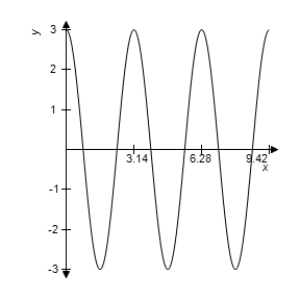
A) period: ; amplitude:
; amplitude: 
B) period: ; amplitude: 3
; amplitude: 3
C) period: ; amplitude: 3
; amplitude: 3
D) period: ; amplitude: 6
; amplitude: 6
E) period: ; amplitude: 3
; amplitude: 3


A) period:
 ; amplitude:
; amplitude: 
B) period:
 ; amplitude: 3
; amplitude: 3C) period:
 ; amplitude: 3
; amplitude: 3D) period:
 ; amplitude: 6
; amplitude: 6E) period:
 ; amplitude: 3
; amplitude: 3
Unlock Deck
Unlock for access to all 60 flashcards in this deck.
Unlock Deck
k this deck
38
Find the period and amplitude of the function 
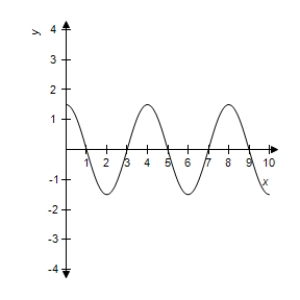
A) Period: 2π; Amplitude: 3
B) Period: 2π; Amplitude:
C) Period: 2; Amplitude:
D) Period: 4; Amplitude: 3
E) Period: 4; Amplitude:


A) Period: 2π; Amplitude: 3
B) Period: 2π; Amplitude:

C) Period: 2; Amplitude:

D) Period: 4; Amplitude: 3
E) Period: 4; Amplitude:


Unlock Deck
Unlock for access to all 60 flashcards in this deck.
Unlock Deck
k this deck
39
Sketch the graph of the function 
A) 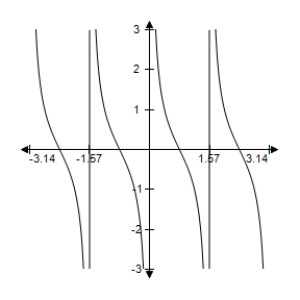
B) 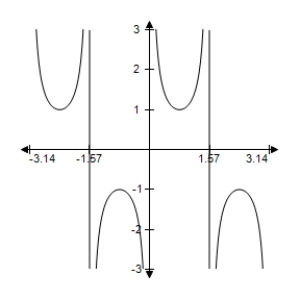
C) 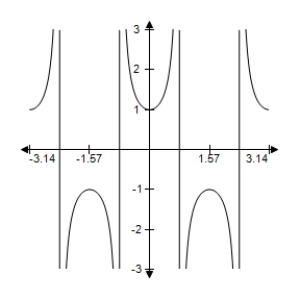
D) 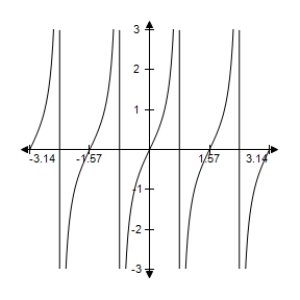
E) 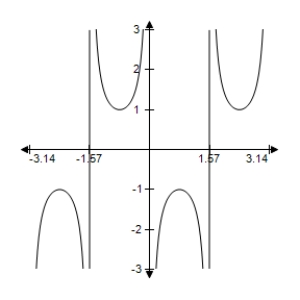

A)

B)

C)

D)

E)


Unlock Deck
Unlock for access to all 60 flashcards in this deck.
Unlock Deck
k this deck
40
Find the period of the trigonometric function. 
A)
B) 6
C)
D)
E)

A)

B) 6
C)

D)

E)


Unlock Deck
Unlock for access to all 60 flashcards in this deck.
Unlock Deck
k this deck
41
The average monthly precipitation P (in inches),including rain,snow,and ice,for Sacramento,California can be modeled by  ,
, 
Where t is the time (in months),with corresponding to January.Find the total annual precipitation for Sacramento.
corresponding to January.Find the total annual precipitation for Sacramento.
A) 18.02 in.
B) 17.69 in.
C) 14.52 in.
D) 16.57 in.
E) 18.90 in.
 ,
, 
Where t is the time (in months),with
 corresponding to January.Find the total annual precipitation for Sacramento.
corresponding to January.Find the total annual precipitation for Sacramento.
A) 18.02 in.
B) 17.69 in.
C) 14.52 in.
D) 16.57 in.
E) 18.90 in.

Unlock Deck
Unlock for access to all 60 flashcards in this deck.
Unlock Deck
k this deck
42
Find the indefinite integral of 
A)
B)
C)
D)
E)

A)

B)

C)

D)

E)


Unlock Deck
Unlock for access to all 60 flashcards in this deck.
Unlock Deck
k this deck
43
Find the derivative of the function  and simplify your answer by using the trigonometric identities.
and simplify your answer by using the trigonometric identities.
A)
B)
C)
D)
E)
 and simplify your answer by using the trigonometric identities.
and simplify your answer by using the trigonometric identities. A)

B)

C)

D)

E)


Unlock Deck
Unlock for access to all 60 flashcards in this deck.
Unlock Deck
k this deck
44
Find the derivative of the function. 
A)
B)
C)
D)
E)

A)

B)

C)

D)

E)


Unlock Deck
Unlock for access to all 60 flashcards in this deck.
Unlock Deck
k this deck
45
Find the derivative of the function and simplify your answer by using the trigonometric identities 
A)
B)
C)
D)
E)

A)

B)

C)

D)

E)


Unlock Deck
Unlock for access to all 60 flashcards in this deck.
Unlock Deck
k this deck
46
For a person at rest,the velocity v (in liters per second)of air flow into and out of the lungs during a respiratory cycle is given by  ,where t is the time in seconds.Inhalation occurs when
,where t is the time in seconds.Inhalation occurs when  and exhalation occurs when
and exhalation occurs when  Find the time for one full respiratory cycle.
Find the time for one full respiratory cycle.
A) seconds
seconds
B) seconds
seconds
C) 6 seconds
D) seconds
seconds
E) 3 seconds
 ,where t is the time in seconds.Inhalation occurs when
,where t is the time in seconds.Inhalation occurs when  and exhalation occurs when
and exhalation occurs when  Find the time for one full respiratory cycle.
Find the time for one full respiratory cycle. A)
 seconds
secondsB)
 seconds
secondsC) 6 seconds
D)
 seconds
secondsE) 3 seconds

Unlock Deck
Unlock for access to all 60 flashcards in this deck.
Unlock Deck
k this deck
47
Suppose that the numbers W (in thousands)of construction workers employed in the United States during 2006 can be modeled by  where t is the time in months,with
where t is the time in months,with  corresponding to January 1.Approximate the month t in which the number of construction workers employed was a maximum.What was the maximum number of construction workers employed? Round your answer to nearest whole number.
corresponding to January 1.Approximate the month t in which the number of construction workers employed was a maximum.What was the maximum number of construction workers employed? Round your answer to nearest whole number.
A) May; The maximum number of construction workers employed is 9,059.
B) March; The maximum number of construction workers employed is 9,039.
C) April; The maximum number of construction workers employed is 9,039.
D) March; The maximum number of construction workers employed is 9,049.
E) April; The maximum number of construction workers employed is 9,049.
 where t is the time in months,with
where t is the time in months,with  corresponding to January 1.Approximate the month t in which the number of construction workers employed was a maximum.What was the maximum number of construction workers employed? Round your answer to nearest whole number.
corresponding to January 1.Approximate the month t in which the number of construction workers employed was a maximum.What was the maximum number of construction workers employed? Round your answer to nearest whole number. A) May; The maximum number of construction workers employed is 9,059.
B) March; The maximum number of construction workers employed is 9,039.
C) April; The maximum number of construction workers employed is 9,039.
D) March; The maximum number of construction workers employed is 9,049.
E) April; The maximum number of construction workers employed is 9,049.

Unlock Deck
Unlock for access to all 60 flashcards in this deck.
Unlock Deck
k this deck
48
Use integration by parts to find the indefinite integral. 
A)
B)
C)
D)
E)

A)

B)

C)

D)

E)


Unlock Deck
Unlock for access to all 60 flashcards in this deck.
Unlock Deck
k this deck
49
Find the indefinite integral. 
A)
B)
C)
D)
E)

A)

B)

C)

D)

E)


Unlock Deck
Unlock for access to all 60 flashcards in this deck.
Unlock Deck
k this deck
50
Find the derivative of the function. 
A)
B)
C)
D)
E)

A)

B)

C)

D)

E)


Unlock Deck
Unlock for access to all 60 flashcards in this deck.
Unlock Deck
k this deck
51
Evaluate the definite integral. 
A) -5
B) 7
C) 0
D) undefined
E) 10

A) -5
B) 7
C) 0
D) undefined
E) 10

Unlock Deck
Unlock for access to all 60 flashcards in this deck.
Unlock Deck
k this deck
52
The normal average daily temperature in degrees Fahrenheit for a city is given by  where t is the time in days,with
where t is the time in days,with  corresponding to January 1.Find the warmest day.
corresponding to January 1.Find the warmest day.
A) March 16
B) March 14
C) April 16
D) April 15
E) April 14
 where t is the time in days,with
where t is the time in days,with  corresponding to January 1.Find the warmest day.
corresponding to January 1.Find the warmest day. A) March 16
B) March 14
C) April 16
D) April 15
E) April 14

Unlock Deck
Unlock for access to all 60 flashcards in this deck.
Unlock Deck
k this deck
53
Find the indefinite integral of the following function. 
A)
B)
C)
D)
E)

A)

B)

C)

D)

E)


Unlock Deck
Unlock for access to all 60 flashcards in this deck.
Unlock Deck
k this deck
54
Determine the relative extrema of the function  on the interval
on the interval 
A) relative minimum:
Relative maximum:
B) relative minimum:
Relative maximum:
C) relative minimum:
relative maximum:
D) relative minimum:
Relative maximum:
E) relative minimum:
Relative maximum:
 on the interval
on the interval 
A) relative minimum:

Relative maximum:

B) relative minimum:

Relative maximum:

C) relative minimum:

relative maximum:

D) relative minimum:

Relative maximum:

E) relative minimum:

Relative maximum:


Unlock Deck
Unlock for access to all 60 flashcards in this deck.
Unlock Deck
k this deck
55
Find an equation of the tangent line to the graph of the function at the given point. 

A)
B)
C)
D)
E)


A)

B)

C)

D)

E)


Unlock Deck
Unlock for access to all 60 flashcards in this deck.
Unlock Deck
k this deck
56
Determine the relative extrema of the function  on the interval
on the interval 
A) relative minimum:
Relative maximum:
B) relative minimum:
Relative maximum:
C) relative minimum:
Relative maximum:
D) relative minimum:
Relative maximum:
E) relative minimum:
Relative maximum:
 on the interval
on the interval 
A) relative minimum:

Relative maximum:

B) relative minimum:

Relative maximum:

C) relative minimum:

Relative maximum:

D) relative minimum:

Relative maximum:

E) relative minimum:

Relative maximum:


Unlock Deck
Unlock for access to all 60 flashcards in this deck.
Unlock Deck
k this deck
57
Find the indefinite integral of the following function. 
A)
B)
C)
D)
E)

A)

B)

C)

D)

E)


Unlock Deck
Unlock for access to all 60 flashcards in this deck.
Unlock Deck
k this deck
58
Find the indefinite integral. 
A)
B)
C)
D)
E)

A)

B)

C)

D)

E)


Unlock Deck
Unlock for access to all 60 flashcards in this deck.
Unlock Deck
k this deck
59
Evaluate the definite integral 
A) 9
B) -9
C)
D)
E) ∞

A) 9
B) -9
C)

D)

E) ∞

Unlock Deck
Unlock for access to all 60 flashcards in this deck.
Unlock Deck
k this deck
60
Find the indefinite integral of 
A)
B)
C)
D)
E)

A)

B)

C)

D)

E)


Unlock Deck
Unlock for access to all 60 flashcards in this deck.
Unlock Deck
k this deck


